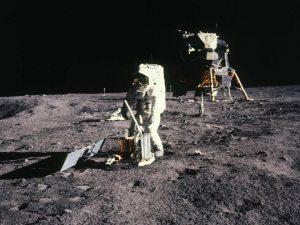We’ve been to the moon, astronauts have spent months floating around the space station, and the dream of many is to eventually visit Mars. But, space isn’t all that friendly to humans.

The Original 7 Mercury Astronauts
Besides the obvious dangers associated with take off and re-entry, and living in an enclosed environment miles above the Earth where immediate rescue is problematic, there are several important medical issues related to prolonged microgravity exposure.

Apollo 11′s Buzz Aldrin on the Lunar Surface
For years we’ve known about the muscle wasting and bone mineral loss that follows the absence of weight bearing in microgravity. Now a new problem has been uncovered: Idiopathic Intracranial Hypertension.
That’s a big word meaning an elevation of the pressure inside the skull. This seems to be due to cerebral edema, an excess accumulation of fluid within the brain that leads to brain swelling. And since the skull, unlike a balloon, is rigid and cannot expand with this increased pressure, the brain suffers.
In a NASA study of 27 astronauts who had spent an average of 108 days in space, MRI brain scans revealed that one third suffered some degree of swelling, typically involving the optic (vision) nerves. In some astronauts, there was also some flattening of the back of the eyeball, which affected focusing, and problems with the pituitary gland, the so-called master gland that regulates many of the body’s hormones.
This will require further study, but on its surface it appears to complicate long-term space travel. Mars just got a little further away.

